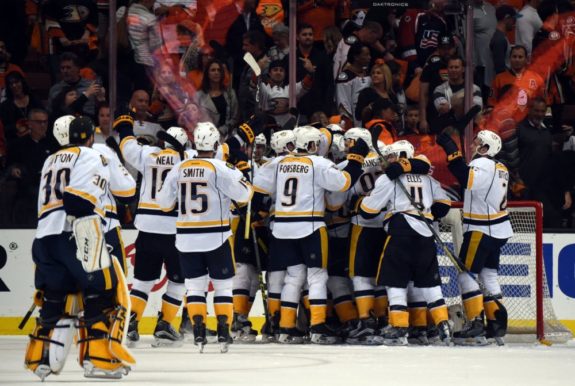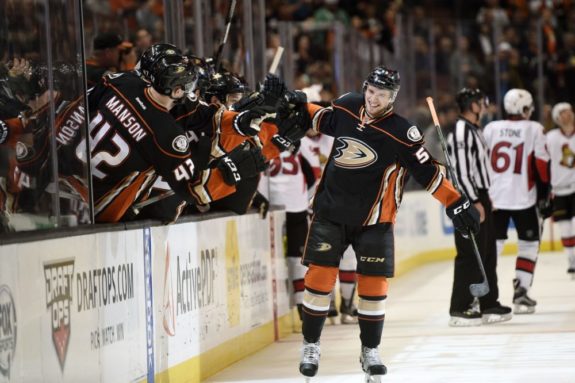Game 7. It’s the Anaheim Ducks’ worst nightmare.
Even though they defeated the Edmonton Oilers in a comeback to take Game 5 in overtime, the Ducks dropped Game 6 in a horrifying 7-1 decision, allowing the Oilers to force Game 7. Sound familiar, anyone? It should. For the past four years, the Ducks have won Game 5, only to lose both Games 6 and 7. And for four straight years, the Ducks have been eliminated in Game 7s, all at Honda Center.
Why? Why does a team that’s won five straight Pacific Division titles constantly drop must-win situations? What goes wrong during elimination games for the Ducks?
Game 6 on Sunday against the Oilers was one such elimination game, and needless to say, it didn’t go well for the Ducks. The brutal 7-1 defeat puts the Ducks in a rough spot for Game 7 on Wednesday, not just physically but mentally as well. The Ducks have to be thinking about their past history facing elimination games, and losing 7-1 in the game before is sure to damage their confidence.
Not to mention that history seems to be repeating itself from last season.
An Unexpected First-Round Exit
Last year during the first round of the playoffs, the Ducks were matched up against the Nashville Predators, who, like this season, were wildly underestimated. The Ducks were supposed to make easy work of them, kind of like the Chicago Blackhawks this season. After losing the first two games at home, the Ducks won the next three. Yet, once again, they lost Games 6 and 7, thanks to strong goaltending by Pekka Rinne. During both games, the Ducks were kept to one goal.

This year, the Ducks once again lost the first two games, then proceeded to win the next three. And once again, during Game 6, they were kept to one goal. It’s enough to give any Ducks fan déjà vu.
Oilers goaltender Cam Talbot has been strong this series. Even though he has allowed the most goals out of all the remaining goaltenders with 19 (the Ducks’ John Gibson follows him with 18), he has the third-best save percentage at .921, along with a 2.95 goals-against average.
Talbot has stolen a game from the Ducks before in this series. During Game 2, the Ducks were kept at one goal after firing 40 shots at Talbot while outplaying the Oilers for much of the game. In Game 7, the Ducks are going to have to find a way to beat Talbot or risk being beat by goaltending once again.
Bounce Back
The Ducks can’t allow the 7-1 defeat to weigh on them. After their encouraging victory, the Oilers are going to come out firing, much like they did in the first period of Game 6, during which they scored five of their goals. The Ducks are going to have to come out even stronger, and thinking about the defeat will distract them from the task at hand.
Luckily, the Ducks are an experienced group and have faced adversity before. They showed that in Game 5 when they were down 3-0 late in the third period. The Ducks then scored three goals in three minutes and 16 seconds to tie the game, sending it to overtime. Corey Perry proceeded to score the game-winning goal in double overtime, showing his experience and patience the whole way.
Take a look:
Perry absolutely freezes Talbot for this goal. A less experienced player could have gotten nervous with such an opportunity to win the game by firing the puck directly at the goaltender. Instead, Perry waited until he was in the optimal position to slide the puck past Talbot’s outstretched pad.
Because they are such an experienced team, bouncing back after a bad game is a Ducks specialty. This season, the Ducks are 6-0-1 in games after ones in which they lost by four or more goals. This means that right after games in which the Ducks had issues finding the back of the net, they often experienced an influx of scoring. Granted, a situation such as this one hasn’t happened since the end of January. Funnily enough, it was a game against the Oilers in which the Ducks were shutout 4-0. The following game was against the Colorado Avalanche, and the Ducks destroyed them 5-1.
A bounce back such as that has happened earlier in this series. After being kept at one goal in Game 2, the Ducks scored six in Game 3. For Game 7 on Wednesday, the Ducks are going to have to experience another scoring influx like that one.
Ignore History
The Ducks are also going to have to forget about their past failings during Game 7s. For the past four years, Bruce Boudreau was the Ducks’ head coach, and the Ducks must hope that their Game 7 curse ended with his firing. Randy Carlyle is back behind the bench for the Ducks, and he has been a much smarter coach, adjusting the Ducks’ lines to match up against the Oilers, and rearranging due to injuries to Patrick Eaves, Ondrej Kase, Kevin Bieska and Logan Shaw, to name a few.

However, the Ducks’ Game 7 troubles began during Carlyle’s first tenure with the Ducks, back in 2009 when they lost to the Detroit Red Wings. In 2013, the Ducks lost to them again in a hard-fought series. Their disappointments have continued from there, the most heartbreaking of which was the 2015 Western Conference Final against the Blackhawks. During the final two games of that series, the Ducks were simply outplayed by the team that would continue on to win the Stanley Cup.
During Game 7 against the Blackhawks, the Ducks allowed them to build momentum early in the game. In the first period, the Blackhawks tallied two goals. They scored two more before the Ducks found the back of the net for the first time, and by then, it was too late. The Ducks ended up losing 5-3, mostly due to weak defense.
The Ducks are a different team now, particularly defensively. Against the Oilers, they have been missing Kevin Bieska, who many fans criticize for being too slow. So the Ducks have been relying on speedy defencemen all under the age of 25 and all their own draft picks. They all will need to play exceptionally well against an Oilers team that has all the momentum.
The Ducks can’t dwell on these past losses, but instead, they must use them as a learning experience. If they dwell, they may be doomed to yet another playoff disappointment.